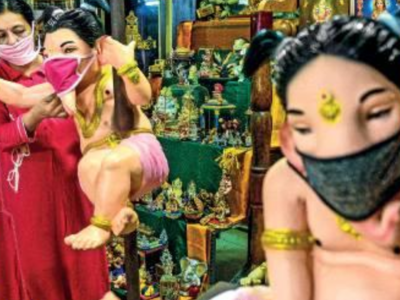
CHENNAI: Two aspects prompted the Madras high court to ignore the government’s reservations and to permit ‘individuals’ to install and immerse Ganesha idols in Tamil Nadu on Saturday.
One, pandemic-time lockdown restrictions in the state have already been relaxed considerably and movement of public during the permitted time is not restricted. Two, the government order banned public installation and celebration of Ganesha Chaturthi, but it did not prohibit individuals to place idols in front of their houses and immerse them in water bodies.
On spiritual count, the division bench of Justice M M Sundresh and Justice R Hemalatha said: “Immersion of Ganesha idols in water bodies is the final part of Chaturthi celebration and it is not complete without the final part.”
As to the submission of advocate-general Vijay Narayan that all beaches in the state are out of bound for public following an order under Disaster Management Act to prevent Covid-19 spread, the bench said, “the prohibition may not have an application when an individual wants to perform the religious obligations in tune with Article 25 (freedom to profess religion).”
The judges further said: “There is no difficulty in holding that the practice which has been followed for decades either by placing the idols after the ceremony in front of the house, temples and immersing them in water bodies will not have any bearing to either the pandemic or the law and order.”
Dispelling doubts as to the applicability of the ruling, the judges said: “At the risk of repetition, we wish to say that it is the individual who does this practice and therefore, there is no possibility of any spread of pandemic. Secondly, it is these individuals who are going to immerse and not any organisation. Therefore, the regular restriction with respect to the number of persons also would apply to these cases.”
The government restriction on festivities had been imposed only to stop the spread of the pandemic, the bench said, adding that the infection is likely to spread on two grounds: when more people congregate in a place or if they stay on thereafter. “We are not in such a situation now,” it said.
Noting that no group of persons can undertake the exercise, the judges said even family members who perform the religious obligation can at best go to a water body, including the sea, drop the idol and thereafter come back.
The judges took judicial note of the predicament faced by idol-making artisans hit hard by the pandemic-induced lockdown. “Such idols are produced by local artisans meant to be used only once in a year. Almost all such idols are made of clay. The longevity of the clay that is being used is very limited, it would not last for more than a few days. Therefore, the idols already manufactured by local artisans would get lost and this cannot be used for any other purpose and this would drastically affect their livelihood particularly during pandemic leading to starvation and penury,” the court said.
The directions were issued on a batch of pleas challenging the GO prohibiting public celebration of Ganesha Chaturthi in Tamil Nadu.
One, pandemic-time lockdown restrictions in the state have already been relaxed considerably and movement of public during the permitted time is not restricted. Two, the government order banned public installation and celebration of Ganesha Chaturthi, but it did not prohibit individuals to place idols in front of their houses and immerse them in water bodies.
On spiritual count, the division bench of Justice M M Sundresh and Justice R Hemalatha said: “Immersion of Ganesha idols in water bodies is the final part of Chaturthi celebration and it is not complete without the final part.”
As to the submission of advocate-general Vijay Narayan that all beaches in the state are out of bound for public following an order under Disaster Management Act to prevent Covid-19 spread, the bench said, “the prohibition may not have an application when an individual wants to perform the religious obligations in tune with Article 25 (freedom to profess religion).”
The judges further said: “There is no difficulty in holding that the practice which has been followed for decades either by placing the idols after the ceremony in front of the house, temples and immersing them in water bodies will not have any bearing to either the pandemic or the law and order.”
Dispelling doubts as to the applicability of the ruling, the judges said: “At the risk of repetition, we wish to say that it is the individual who does this practice and therefore, there is no possibility of any spread of pandemic. Secondly, it is these individuals who are going to immerse and not any organisation. Therefore, the regular restriction with respect to the number of persons also would apply to these cases.”
The government restriction on festivities had been imposed only to stop the spread of the pandemic, the bench said, adding that the infection is likely to spread on two grounds: when more people congregate in a place or if they stay on thereafter. “We are not in such a situation now,” it said.
Noting that no group of persons can undertake the exercise, the judges said even family members who perform the religious obligation can at best go to a water body, including the sea, drop the idol and thereafter come back.
The judges took judicial note of the predicament faced by idol-making artisans hit hard by the pandemic-induced lockdown. “Such idols are produced by local artisans meant to be used only once in a year. Almost all such idols are made of clay. The longevity of the clay that is being used is very limited, it would not last for more than a few days. Therefore, the idols already manufactured by local artisans would get lost and this cannot be used for any other purpose and this would drastically affect their livelihood particularly during pandemic leading to starvation and penury,” the court said.
The directions were issued on a batch of pleas challenging the GO prohibiting public celebration of Ganesha Chaturthi in Tamil Nadu.

Coronavirus outbreak
Trending Topics
LATEST VIDEOS
More from TOI
Navbharat Times
Featured Today in Travel
Get the app









